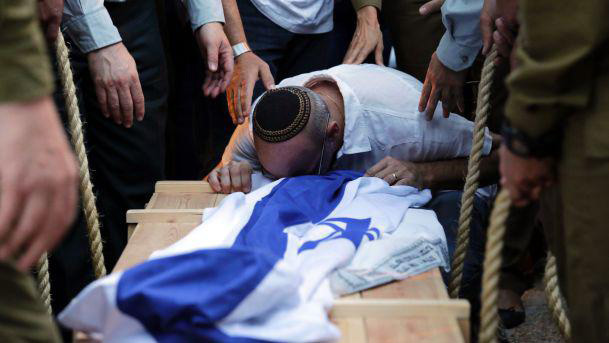JORDAN BENSEMHOUN, 22, HAD IMMIGRATED AT AGE 16 FROM HIS NATIVE LYON AND LATER JOINED THE ARMY, SERVING IN AN ELITE UNIT OF THE GOLANI INFANTRY BRIGADE.
Ha’aretz – Ariel David 22nd July, 2014

A relative of Israeli soldier Jordan Bensemhoun, who also holds French citizenship, mourn over his coffin during his funeral in Ashkelon, Israel, July 22, 2014.
Thousands of people from around Israel gathered Tuesday evening for the funeral of French immigrant Jordan Bensemhoun, the 22-year-old staff sergeant who died Sunday during Israel’s ground offensive in Gaza.
Bensemhoun’s parents flew in for the funeral in the southern city of Ashkelon, the young man’s adoptive hometown. Bensemhoun had immigrated at age 16 from his native Lyon and later joined the army, serving in an elite unit of the Golani infantry brigade.
“You are no longer a lone soldier,” Immigrant Absorption Minister Sofa Landver said at the military cemetery. “Look how many people are around you, look how many have come to say goodbye.”
Police said around 6,000 people had come for the ceremony, most from Israel’s large French community, as well as friends and army comrades.
“From the moment I met you, I realized I didn’t know what real Zionism was,” said Itai Leibovitch, Bensemhoun’s commanding officer. Recalling the young man’s commitment, Leibovitch said that during training he had to convince Bensemhoun to take leave and see his parents after he had not seen them for nearly a year.
At the funeral, at least two people fainted, including Bensemhoun’s grandmother Miriam, who collapsed at the entrance of the cemetery and had to be carried in on a stretcher.
Bensemhoun died when the military vehicle he was traveling in was hit by an anti-tank missile. He was one of the 13 Golani fighters killed in Gaza City’s Shujaiyeh neighborhood. He was also one of three lone soldiers killed, two of them U.S. citizens.
“They come here to defend the country, even though they don’t have to,” said Tzvika Levi, head of a kibbutz project that supports lone soldiers. “They always tell me: ‘If we die, we die for a good cause.’”
Levi, who was carrying cotton branches for the grave, said he last saw Bensemhoun a few days ago at a barbecue for the soldiers he follows. This was just before the ground offensive.
“I had already left and [Bensemhoun] ran after me and gave me a big hug,” Levi told Haaretz before the funeral. “Maybe he wanted to say goodbye.”
After politicians and military leaders paid their respects, some of Bensemhoun’s relatives spoke, using both French and Hebrew. Loren, one of his two sisters, called him “the perfect brother and the perfect son: modest, humble and courageous.” Calling her brother by his nickname, she sobbed: “Au revoir, Jojo.”
A cousin, Alexander Guedj, said Bensemhoun had always supported him when he immigrated a few years ago and started training in an army search-and-rescue unit.
The 21-year-old Guedj said Bensemhoun “will always be my role model.”

